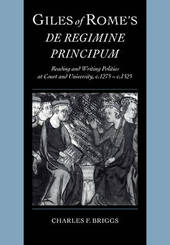
|
Giles of Rome's De regimine principum: Reading and Writing Politics at Court and University, c.1275-c.1525
Paperback / softback
Main Details
| Title |
Giles of Rome's De regimine principum: Reading and Writing Politics at Court and University, c.1275-c.1525
|
| Authors and Contributors |
By (author) Charles F. Briggs
|
| Series | Cambridge Studies in Palaeography and Codicology |
|---|
| Physical Properties |
| Format:Paperback / softback | | Pages:224 | | Dimensions(mm): Height 244,Width 170 |
|
| Category/Genre | History of writing
Archaeology by period and region |
|---|
| ISBN/Barcode |
9780521103442
|
| Classifications | Dewey:320.1 |
|---|
| Audience | | Professional & Vocational | |
|---|
| Illustrations |
8 Tables, unspecified; 17 Halftones, unspecified
|
|
Publishing Details |
| Publisher |
Cambridge University Press
|
| Imprint |
Cambridge University Press
|
| Publication Date |
18 December 2008 |
| Publication Country |
United Kingdom
|
Description
From the time of its composition (c.1280) for Philip the Fair of France until the early sixteenth century, Giles of Rome's mirror of princes, the De regimine principum, was read by both lay and clerical readers in the original Latin and in several vernacular translations, and served as model or source for several works of princely advice. This study examines the relationship between this didactic political text and its audience by focusing on the textual and material aspects of the surviving manuscript copies, as well as on the evidence of ownership and use found in them and in documentary and literary sources. Briggs argues that lay readers used De regimine for several purposes, including as an educational treatise and military manual, whereas clerics, who often first came into contact with it at university, glossed, constructed apparatus for, and modified the text to suit their needs in their later professional lives.
Reviews"...his masterful account of the later medieval history of the text does a compelling job of clearing much of the historical obscurity away from such an important and underappreciated text." Albion "Its rich detail and different lines of inquiry allow the book to achieve an optimum of both information and analysis." Speculum
|